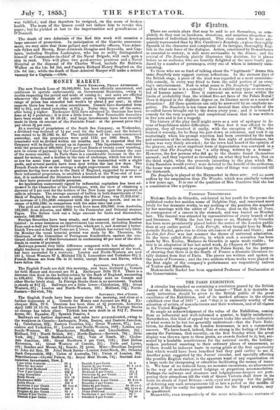Ckt 'Andra.
There are certain plays that may he said to act themselves, so COM- pletely do they rest on incidents, situations, and surprises altogether in- dependent of individual development. This class cannot be more ade- quately represented than by Mrs. Centlivre's Busybody; apiece thoroughly Spanish in the character and complexity of its intrigue, thoroughly Eng- lish in the rude force of the dialogue. Action, considered by Demosthenes so essential to oratory, is still more serviceable to the drama; and the revival of The Busybody plainly illustrates this doctrine, for it places before us an audience who are heartily delighted at the more bustle pro- duced by a number of personages, every one of whom is intensely unin- teresting. To those who are so fond of talking about the " legitimate " drama this same Busybody may suggest curious reflections. In the sternest days of the British stage, a piece of the kind was regarded as a most unmistake- able comedy, in every way fitted to form the solid portion of an even- ing's entertainment. Now in what sense is The Busybody "legitimate," and in what sense is it a comedy? Does it exhibit any type or even sym- bol of human nature? Does it represent an action more within the limits of probability than the wildest five-act farce of the Palais Royal? Does it depend in the slightest degree on its literary merit as a source of attraction? All these questions can only be answered by an emphatic ne- gative. The Busybody is ten times more farcical than nine-tenths of the so-called farces brought out by the dozen every year; and it is termed a comedy for the very negative and unspiritual reason that it was written in five acts and is not a tragedy. The history of the play itself might serve as a sort of apologuo in fa- vour of hopefulness under difficulties. When first it was offered to the players, they all received it coolly, with the exception of Wilke, who treated it warmly, for he flung his part down at rehearsal, and took it up mutteringly when hie prompt rejection had been overruled by the tears and entreaties of the authoress. On the first night of performance, the house was very thinly attended; for the town had heard of the opinion of the players, and a most ungallant form of depreciation was conveyed in a rumour that The Busybody was "a silly thing, written by a woman." However, the few persons who did go to the theatre found themselves amused; and they reported so favourably on what they had seen, that on the third night, when the proceeds (according to the plan which Mr. John Saunders would revive) were devoted to the benefit of the authoress, the house was crowded, and this happy state of things was continued till the thirteenth.
The Busybody is played at the Haymarket in three acts and no more suffers by the amputation than The Wonder, which was similarly reduced a few years ago. It is one of the qualities of Mrs. Centlivre that she has a constitution like a polypus.


























 Previous page
Previous page